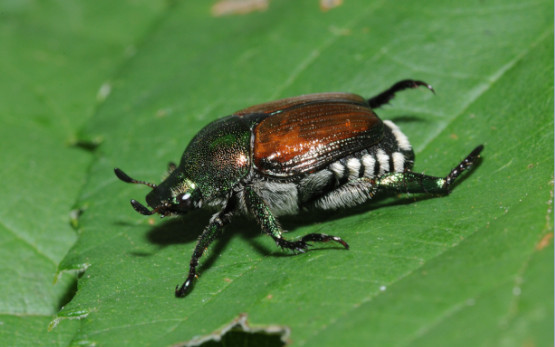As the holiday season kicks off, the Federal Office for Agriculture calls on holidaymakers to refrain from accidentally importing insect stowaways, since exotic pests such as the Japanese beetle – so called ‘non-indigenous species’ – can cause major damage.
The voracious Japanese beetle first reached the Canton of Ticino in 2017. Feeding on over 300 plant species, it represents a major threat to agriculture, horticulture and the environment. Back in 2022, over 600,000 specimens of this pest were trapped in the Canton of Ticino.
Distinguishing traits
Adult Japanese beetles are 10–12mm long (like a Swiss 5-rappen coin) with metallic copper-coloured elytra (wing cases). The small, light-coloured tufts of hair on the abdomen are characteristic: there are five small tufts on each side of the body, and two larger tufts on the abdomen.
How can introduction be prevented?
The Japanese beetle spreads over long distances largely thanks to human assistance. The following measures are recommended:
- Check vehicles and suitcases/bags for beetles before your return journey
- Do not bring any plants, cut flowers, vegetables or fruit back home from your holiday, as they could be a vehicle for introducing other pests and diseases besides Japanese beetle.
What to do if you suspect Japanese beetle:
- Trap, photograph and freeze beetle
- Make a note of the location, and if possible the name of the plant, on which the insect was observed
Inform the responsible Cantonal Plant Protection Service
Compulsory notification and control
In Switzerland, Japanese beetle is regulated as a quarantine organism, i.e. there is a general obligation to report and control this insect species.
Increasing problems with non-indigenous species
Increasingly, non-indigenous species like the Japanese beetle are spreading across Europe and Switzerland. Among the reasons for this are globalised trade, human mobility and global warming.






